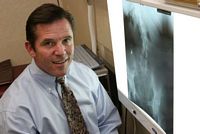|
https://www.chiroeco.com/on-the-road-again-occupational-medicine/ James Raker, DC, FADP, CME [email protected] https://www.occmedfordcs.com Chiropractic Economics 2015,Chiorpractic Business Tips, Issue-15-2-15, Magazine Issues September 24, 2015 Occupational medicine encompasses any services concerned with the safety and well-being of workers. The government requires that these services be done to protect employees, and the care is paid for by companies or select individuals with no insurance involved.
This type of work is available to DCs even in small towns. It brings with it a certain prestige, and once you’ve earned a solid reputation, the companies you serve with occupational medicine will eventually ask you to be their company doctor for work injuries. Chiropractors—are you listening yet? When you offer occupational medicine, you put yourself in the driver’s seat where you can keep expanding the range of your services. You might get paid cash to answer the phone when someone gets injured just to tell the employer whether it’s a problem you want to handle, or if it warrants a visit to the local emergency room. As a reference, I get paid $100 to answer the phone, and if it’s after hours, I get paid $750 to check out an injury (even if I don’t treat it). Mining for gold Many jobs require a physical exam to ensure employees can do a job without injuring themselves or others. Truck drivers are required to get a physical every one to two years. The purpose is to ensure they are eligible to operate a large vehicle without harming themselves or the millions of other passengers on the road. The federal government gave chiropractors a golden egg for the first time in history by allowing them to participate in these evaluations despite the objection of the American Medical Association. The other jewel that comes with administering Department of Transportation (DOT) physicals is this: Prior to May 2014, every MD, DO, NP, PA, and DC could sign off on a truck driver physical. That means there were more than 800,000 healthcare providers that could do the work. As of May of 2014, to do these physicals, a provider has to take a 12-hour certification course and pass a test. The number of certified providers now stands at only around 60,000 for the entire country. The available work is funneled to the providers who are certified. There are approximately 14 million drivers, so $40 to $100 per physical equates to $560 million to $1.4 billion in revenue. Truck drivers are also tested randomly for drug and alcohol use. Other jobs require physicals to test for problems such as colorblindness if an employee will have to decipher color codes, e.g., certain electrical components. Many physicals require not only visual acuity but hearing acuity and lung capacity (painters or fire fighters who wear respirators). Workers’ hearing also has to be protected in loud environments to prevent loss, and the government mandates annual hearing testing based on safety rules. There are mandates for heavy-metals testing to protect workers from toxin exposure as well. In all, there are about 12 services that DCs in most states can provide. Some require further training or certification, and others do not. Let’s look at the simpler services. Easy add-ons Ordering blood work and running heavy-metals panels at a lab does not require extra certification. Any DC whose current scope of practice allows lab work can do this. The best thing about heavy-metals testing is that you don’t have to draw the blood at your office. You can have the patient walk into a local lab (or even a local medical clinic you hire), and that operation will draw the blood and send you the results. Your job is to report back to the employer that the worker is in the normal range or not. If you identify a problem, you inform the company that the employee needs to be moved from any areas of exposure and retested monthly until toxin levels are back to normal. Extremely high toxin levels would prompt you to refer the employee to a specialist for chelation therapy with the goal of removing the heavy metals from the body. But you get paid to monitor the safety and well-being of all the employees. It’s as easy as ordering the blood draw; reading the results as normal, slightly above normal, or much higher than normal; and reporting those results back to the employer. You get paid about $100 to $200 to do this work. Many tests in non-DOT-related industries also do not require certification. Services including physicals, drug testing, DNA testing, alcohol testing, vision testing (vision acuity by Snellen chart, color with an Ishihara book) for non-DOT-related work can be provided without additional certification. What will the financial impact on your business be? Well, you can contract with a company to do whatever work it needs on a pay-immediately basis or at least within 30 days of invoice. Say a company has 300 workers, and it wants to drug test 10 percent randomly every month. That’s 30 drug screens at around $30 to $60 (depending on your area of the country), which is $900 to $1,800 of income in about three hours. What’s more, a well-trained staff member can provide most evaluations (except physicals) without your direct supervision. So you can have one of your employees visit a company, do the work, and bring you back a check even when you’re on vacation. Many companies want several services accomplished when you or your staff shows up. If a company wants drug and alcohol tests done at the same time, you can bill for both. And if they want the work performed monthly, it’s a steady stream of income. Opportunities for occupational medicine abound with local businesses, government agencies (city, police, fire), state agencies (e.g., child protective services), and federal agencies (e.g., Army depot workers). So no matter where you are, there’s work to be done. Don’t let someone else be the one to fill the void.
0 Comments
Your comment will be posted after it is approved.
Leave a Reply. |
James Raker, DCTeaching DC's occupational health evaluation services for the past 20 years. Wayne Hebert, DC
Marketing Director OccMed For DC's Archives
December 2022
Categories |



 RSS Feed
RSS Feed